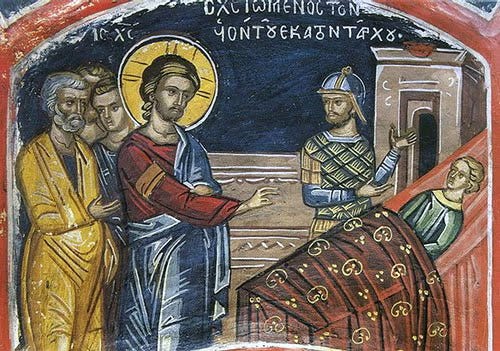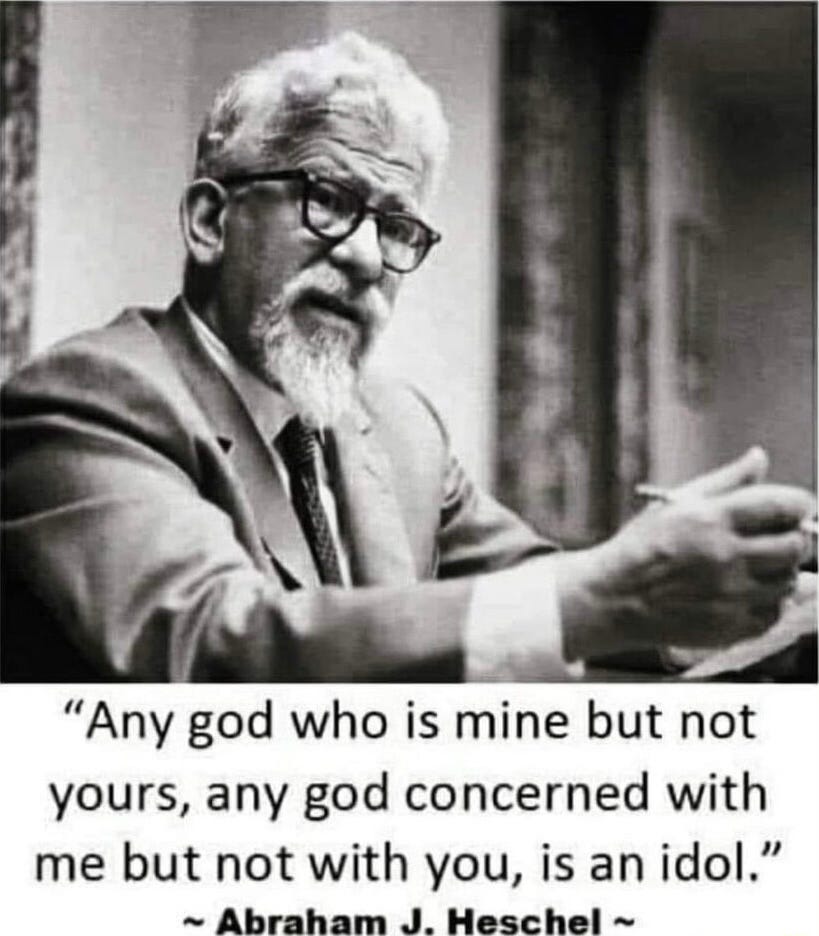From the East and the West
Kinship in the kingdom of God, and the kind of faith Jesus is looking for
This is a story of Jesus that doesn’t get nearly enough attention, but it’s one of my favorites. Jesus heals a centurion’s “servant” (possibly more going on in this relationship), and praises the centurion’s faith— he “gets it,” while so many of Jesus’s own religion fail to get it. What exactly is the truth that the centurion understands? Why is Jesus so shocked by his faith?
Matthew 8:5-13
5 When Jesus had entered Capernaum, a centurion came to him, asking for help. 6 “Lord,” he said, “my servant lies at home paralyzed, suffering terribly.”
7 Jesus said to him, “Shall I come and heal him?”
8 The centurion replied, “Lord, I do not deserve to have you come under my roof. But just say the word, and my servant will be healed. 9 For I myself am a man under authority, with soldiers under me. I tell this one, ‘Go,’ and he goes; and that one, ‘Come,’ and he comes. I say to my servant, ‘Do this,’ and he does it.”
10 When Jesus heard this, he was amazed and said to those following him, “Truly I tell you, I have not found anyone in Israel with such great faith. 11 I say to you that many will come from the east and the west, and will take their places at the feast with Abraham, Isaac and Jacob in the kingdom of heaven. 12 But the subjects of the kingdom will be thrown outside, into the darkness, where there will be weeping and gnashing of teeth.”
13 Then Jesus said to the centurion, “Go! Let it be done just as you believed it would.” And his servant was healed at that moment.
Many scholars have speculated that the centurion's servant was his same-sex lover, because of the concern he shows for him, which seems to betray a greater care than for a mere servant. The greek word used to describe him, pais (as opposed to doulos, the word for a slave or menial servant) was often used for a servant with sexual connotations, and these relationships between younger and older men were quite common among the Roman elite.
If that was the case, it seems to be of no concern to Jesus. Jesus does not condemn the nature of this relationship, or encourage the centurion to turn away from Roman paganism to convert to Judaism or Christianity. No, in fact Jesus commends the centurions faith as a paradigm of what the kingdom of God looks like! “Truly I tell you, I have not found anyone in Israel with such great faith.” What so impressed Jesus?
The conservative interpretation is simply that the centurion has faith in Jesus’s power and identity as the Son of God. Is that why Jesus is so impressed? I think something more is going on here.
This centurion had no understanding of Christian doctrines. The faith of the centurion was not that he believed Jesus was “God in the flesh” or that Jesus was going to “die for his sins.” The faith Jesus commended was the way that the centurion recognized God’s spirit at work in Jesus, even though Jesus was far outside of his own Roman culture.
Because of cultural distance, the surprising nature of this interaction is probably lost on us. Jesus was a homeless, middle eastern prophet. The Roman centurion was a cultural elite from the most advanced civilization in the world. He would have been socialized to think of a foreign peasant like Jesus as entirely beneath him. Asking Jesus for help was a scandalous act of humility.
Imagine during the occupation of Afghanistan in the mid 2000s, if a white, American, Christian Marine Corps Colonel sought out an Islamic sage living in a mud hut on a mountainside, and asked him for spiritual direction! Why is that dynamic so difficult for us to imagine? What stands in the way of this? Cultural and religious superiority. Ethnocentrism. Paternalism. Racism. Classism. Colonization. These cancers of the human heart stand in the way of love and the beloved community. They are satanic lies.
The mystic Jewish Rabbi Abraham Heschel, who marched with Dr King in the civil rights movement said, “the redeeming quality of man lies in his ability to sense his kinship with all men.” It is our spiritual blindness that causes us to miss this truth. Jesus saves us by opening our eyes to our true humanity and our kinship with each other. Until we see this truth, we have not truly met God. Heschel writes, “any god who is mine but not yours, any god concerned with me but not with you, is an idol.” The easiest way to blaspheme against God is to assume a posture of superiority over our neighbors. It is a great tragedy that although Jesus never allows us to do this, millions do it in his name.
In a world of division, where we believe that our people and our culture are in the right, and other people need our answers, this centurion believed that God was at work in a culture very different from his own. Instead of seeing Jesus as beneath him, he entered a posture of mutuality and curiosity, and received a gift. Jesus became his savior. The centurion found his savior in the face of the cultural “other.”
Jesus sees the centurion’s faith as a prototype of the kingdom he is building. “Many will come from the east and west”– a global family is joining together, united by our common humanity and our shared divinity; united by the Spirit that falls on all flesh; united by love.
Jesus also uses strong language in this passage– “weeping and gnashing of teeth.” Many of us think of this as symbolism of an eternal afterlife in hell. But what is Jesus describing? Jesus says that The kingdom of God is a feast that everyone can get in on, but some of his own people will miss the beauty of inclusion. Jesus laments that this centurion was able to grasp this universal vision, even more than the religious leaders of Jerusalem. To refuse to see the universality of God, to insist on seeing other people and nations and cultures and religions as “lesser than,” as outside the reach of God’s grace— this is spiritual darkness. This is hell.
Hell is what happens when we fail to recognize our kinship with each other, and we don’t have to wait for the afterlife to experience it. Like the older brother in Jesus’s parable of the prodigal son, our need to exclude keeps us pouting outside of the feast, while inside the Father is throwing a universal party for every tribe, tongue, and nation.
For this breath prayer, imagine people of all cultures, races, religions, gender identities, and sexual orientations coming together in one giant party— and you are invited too.
Inhale: God is not mine (4 seconds)
-HOLD- (4 seconds)
Exhale: God is with all people (4 seconds)
Inhale: Many will come from the east and the west (4 seconds)
-HOLD- (4 seconds)
Exhale: We are all one family (4 seconds)







Great essay! This speaks to my innate intuition even as a child that this call to go witness and save others was mis-attuned. This never settled right with me; that Jesus meant the doctrine of resurrection excluded so many. Thank you for your work and insight!
Thank you for the essay, it has inspired me to dig into my Bible to study a few points that I might have missed!
I wanted to check, "Pais" in Greek is used in many places where it has no affectionate connotations. Such as when Herod orders the slaughter of young children (Matthew 2:18). I think it's very important to be precise on this, and I'm not entirely sure there's necessarily a romantic tilt to the word here. Could you share where the word has been used in such a context? Thank you!